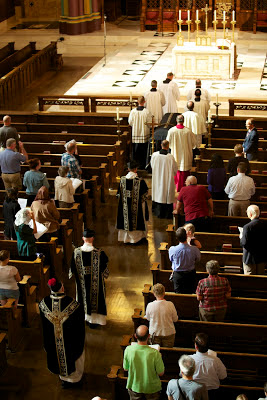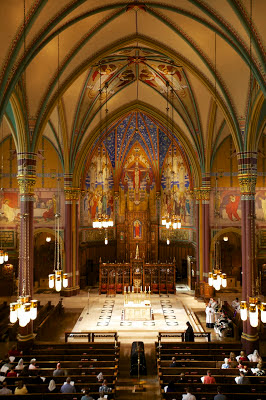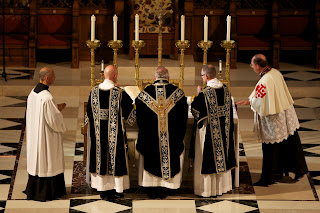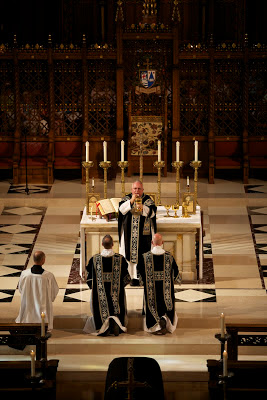Here are photographs of Thursday's Requiem Mass in the Extraordinary Form for deceased CMAA Members at the Madeleine Cathedral in Salt Lake City. Monsignor Andrew Wadsworth, Executive Director of ICEL, was the Celebrant. Monsignor Wadsworth's sermon is reproduced below.
Homily at the Annual Requiem Mass for Deceased Members of the Church Music Association of America celebrated by Msgr Andrew Wadsworth in the Cathedral of the Madeleine, Salt Lake City, June 20, 2013
From the Sequence at this Requiem Mass: 'tantus labor not sit cassus' (may such labor not be in vain)
As I arrived for the Colloquium at the beginning of the week, I received news from England of the death of a greatly beloved brother priest of the Diocese of Westminster, Fr Michael Pinot de Moira, chaplain of St Edmund's College, Ware - England’s oldest Catholic School. Father Pinot first arrived at St Edmund's in September 1944 as a schoolboy aged 12. Having wanted to become a priest from an early age, he subsequently transferred to the diocesan seminary also at the College, and was ordained there on 26 May 1956, the feast of St Philip Neri.
Apart from a short spell of two years as an associate pastor in St John’s Wood in North London, Father Pinot spent fifty-five of his fifty-seven years as a priest as a chaplain and teacher in the same school. He never became a pastor. As a teacher of Latin, French and Mathematics, he could identify a chattering student whilst facing in the wrong direction; he knew his 'times-tables' better than most calculators; and, most confusingly of all, he delighted in speaking in Latin to his students! A legend in the classroom, a first-class cricket umpire, he was universally regarded by his pupils and colleagues as the greatest living Edmundian treasure.
Apart from these very particular skills, Fr Pinot will be remembered by the priests of our diocese for two things which made him an outstandingly good and holy priest in our eyes: every summer, he spent weeks of his vacation visiting new pupils and their families at home before they started at the College – this was no mean feat when you consider that St Edmund's welcomes over 100 new students each year from all over the south of England. It established a strong bond between this priest and his charges which often extended to their families, who came to see him as a member of their own family, someone to whom they could always turn, someone who would always be responsive to them, particularly in difficult moments. The second and less conspicuous virtue of Fr Pinot was that he was tremendously faithful in remembering to pray for the dead. A prodigious memory enabled him to continually recall past pupils and colleagues and even those long forgotten whom he frequently remembered at his Mass each day.
I am telling you about Fr Pinot today not just to edify you with an account of a good and holy priest whose life was marked by humility, compassion and great fidelity but to call to mind that in the lives of holy men and women, we perceive qualities which in their undiluted form are all attributes of God, His goodness, His holiness, His mercy and His continual love and care for us in the smallest details of our life. This Requiem Mass is expressive of the perennial truth that all life matters, it is holy, because we are all made in the image and likeness of the Most Holy God, who shares His life with us and to the image of whose Son we are eternally conformed in Holy Baptism, incorporating us forever into the mystery of Our Savior’s suffering, dying and rising.
I am very conscious that in the year since we met, some have you have suffered the loss of someone very dear to you, maybe a close relative or friend. Someone who cannot be replaced and whose loss leaves a void in your life and is a great sadness to you. This Requiem is most particularly for deceased members of the CMAA and all our deceased family and friends, remembering especially those who have died during the past year. In this Holy Mass, in its every gesture and prayer, from the opening absolution over the Missal during the introit to the final ceremonies of the absolution at the catafalque, everything is marshaled towards the single end of praying for the dead and pleading the sacrifice of Christ for those who have died in His friendship that they may be brought at length to the fullness of the life of the saints in heaven.
What a great consolation we find in this liturgy, in its prayers and chants which seem so expressive of the human dilemma and so relentless in underlining that God alone is the answer to the distressing reality of death. He who made us, He who knows us, He who loves us – He is the judge before whom we must all appear and only He is able to read all hearts. He alone is the equipped with the necessary knowledge of our truest intentions in the light of the most imperfect of our actions. We judge one another so easily by what we see in our actions and words. God alone knows what we mean by what we say and do and He alone is therefore able to judge us. We take confidence that His mercy is greater than all our weakness and that His desire to forgive us is so much greater than the mess we make of our lives, even if at times, the mess seems very great.
In a few moments, our prayers find a focus in the catafalque, which represents all those whom we have lost and whom we mourn. Msgr Ronald Knox said that the ceremonies of the absolution are the “tears and the sighs we cannot find”, the Church weeps for her children and makes the prayer that so great a redemption may not be in vain and may yet bear in us all the fruit of eternal life.
Eternal rest grant unto them O Lord, and let perpetual light shine upon them. May they rest in peace. Amen.
May their souls + and the souls of all the faithful departed, through the mercy of God rest in peace. Amen.
Image may be NSFW.From the Sequence at this Requiem Mass: 'tantus labor not sit cassus' (may such labor not be in vain)
As I arrived for the Colloquium at the beginning of the week, I received news from England of the death of a greatly beloved brother priest of the Diocese of Westminster, Fr Michael Pinot de Moira, chaplain of St Edmund's College, Ware - England’s oldest Catholic School. Father Pinot first arrived at St Edmund's in September 1944 as a schoolboy aged 12. Having wanted to become a priest from an early age, he subsequently transferred to the diocesan seminary also at the College, and was ordained there on 26 May 1956, the feast of St Philip Neri.
Apart from a short spell of two years as an associate pastor in St John’s Wood in North London, Father Pinot spent fifty-five of his fifty-seven years as a priest as a chaplain and teacher in the same school. He never became a pastor. As a teacher of Latin, French and Mathematics, he could identify a chattering student whilst facing in the wrong direction; he knew his 'times-tables' better than most calculators; and, most confusingly of all, he delighted in speaking in Latin to his students! A legend in the classroom, a first-class cricket umpire, he was universally regarded by his pupils and colleagues as the greatest living Edmundian treasure.
Apart from these very particular skills, Fr Pinot will be remembered by the priests of our diocese for two things which made him an outstandingly good and holy priest in our eyes: every summer, he spent weeks of his vacation visiting new pupils and their families at home before they started at the College – this was no mean feat when you consider that St Edmund's welcomes over 100 new students each year from all over the south of England. It established a strong bond between this priest and his charges which often extended to their families, who came to see him as a member of their own family, someone to whom they could always turn, someone who would always be responsive to them, particularly in difficult moments. The second and less conspicuous virtue of Fr Pinot was that he was tremendously faithful in remembering to pray for the dead. A prodigious memory enabled him to continually recall past pupils and colleagues and even those long forgotten whom he frequently remembered at his Mass each day.
I am telling you about Fr Pinot today not just to edify you with an account of a good and holy priest whose life was marked by humility, compassion and great fidelity but to call to mind that in the lives of holy men and women, we perceive qualities which in their undiluted form are all attributes of God, His goodness, His holiness, His mercy and His continual love and care for us in the smallest details of our life. This Requiem Mass is expressive of the perennial truth that all life matters, it is holy, because we are all made in the image and likeness of the Most Holy God, who shares His life with us and to the image of whose Son we are eternally conformed in Holy Baptism, incorporating us forever into the mystery of Our Savior’s suffering, dying and rising.
I am very conscious that in the year since we met, some have you have suffered the loss of someone very dear to you, maybe a close relative or friend. Someone who cannot be replaced and whose loss leaves a void in your life and is a great sadness to you. This Requiem is most particularly for deceased members of the CMAA and all our deceased family and friends, remembering especially those who have died during the past year. In this Holy Mass, in its every gesture and prayer, from the opening absolution over the Missal during the introit to the final ceremonies of the absolution at the catafalque, everything is marshaled towards the single end of praying for the dead and pleading the sacrifice of Christ for those who have died in His friendship that they may be brought at length to the fullness of the life of the saints in heaven.
What a great consolation we find in this liturgy, in its prayers and chants which seem so expressive of the human dilemma and so relentless in underlining that God alone is the answer to the distressing reality of death. He who made us, He who knows us, He who loves us – He is the judge before whom we must all appear and only He is able to read all hearts. He alone is the equipped with the necessary knowledge of our truest intentions in the light of the most imperfect of our actions. We judge one another so easily by what we see in our actions and words. God alone knows what we mean by what we say and do and He alone is therefore able to judge us. We take confidence that His mercy is greater than all our weakness and that His desire to forgive us is so much greater than the mess we make of our lives, even if at times, the mess seems very great.
In a few moments, our prayers find a focus in the catafalque, which represents all those whom we have lost and whom we mourn. Msgr Ronald Knox said that the ceremonies of the absolution are the “tears and the sighs we cannot find”, the Church weeps for her children and makes the prayer that so great a redemption may not be in vain and may yet bear in us all the fruit of eternal life.
Eternal rest grant unto them O Lord, and let perpetual light shine upon them. May they rest in peace. Amen.
May their souls + and the souls of all the faithful departed, through the mercy of God rest in peace. Amen.
Clik here to view.











